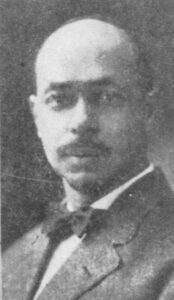
Roscoe Bruce
*Roscoe Bruce was born on this date in 1879. He was a Black educator known for stressing the value of practical industrial and business skills instead of academic disciplines.
Roscoe Conkling Bruce was born in Washington, D.C., the only son of U.S. Senator Blanche Bruce and his wife, Josephine Beall Willson Bruce. His father was a Republican, a former slave, and the second Black elected to the U.S. Senate. Josephine Beall Willson was the daughter of a Cleveland dentist. She had been an elementary school teacher. He was their only child.
His secondary education was first at Washington's M Street High School and then at Phillips Exeter Academy, where he was one of the student newspaper editors. He went on to Harvard University in 1898. At Harvard in 1898, he won the Pasteur Medal for debating. In 1899, he represented Harvard in a debate against Princeton University, and in 1900, he represented Harvard against Yale University and won the Coolidge Debating Prize. He graduated with an A.B. degree in 1902, magna cum laude, and became a member of the Phi Beta Kappa Society.
During the summer break of his senior year, while visiting his mother at Tuskegee, Bruce won a fan in Booker T. Washington and secured a position as head of the Academic Department at Tuskegee. He was hired to change the curriculum to become less academic and emphasize more practical skills, a change that was unpopular with the faculty and the students.
From 1902 to 1906, Bruce supervised the Academic Department of Tuskegee Institute and taught classes. Bruce advised Washington to expand Tuskegee to other countries like South Africa. On June 3, 1903, Bruce married Clara Washington Burrill at the Fifteenth Street Presbyterian Church. Wanting to move into the Washington D.C. Schools, he asked Washington to help him secure a position and actively lobbied for Bruce with Mary Church Terrell, a Black District school board member, to work behind the scenes for the appointment.
Bruce first became the supervising principal of a district and was promoted to Assistant Superintendent in charge of all Colored Schools in the District of Columbia. He felt that industrial and business education were essential and tried to convert the school into a technical high school. He demanded that every student at the Dunbar High School take at least one industrial course. A boys' and a girls' vocational school were established on his recommendation. He supported the reorganization of the Washington D.C. school system under the Congressional Organic Act of 1906, which gave control of the public school to a board of education whose members were appointed by the Supreme Court of the District of Columbia and who served three-year terms without pay.
In 1919, Bruce allowed Professor Herman Marie Bernolet Moens, a Dutch ethnologist, to take nude photographs of Black high school students, allegedly as part of a study of physical differences between the races. In July 1921, Bruce resigned from his position amid the controversy. Following his resignation, he took charge of a project to organize high schools for Black children in Kimball, West Virginia, and later became principal of Kimball's Browns Creek District High School. Roscoe Bruce died in New York City on August 16, 1950, at 71. He was buried in Woodlawn Cemetery in Washington, D.C.